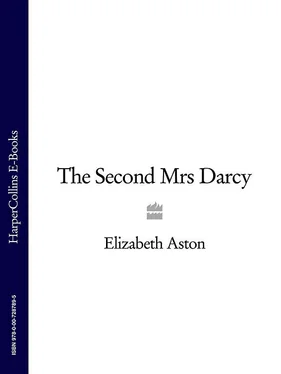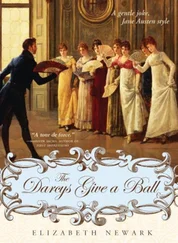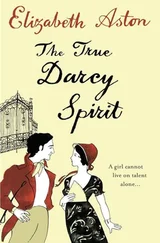ELIZABETH ASTON
For Jessica Buckman with love
The Second Mrs. Darcy
Title Page ELIZABETH ASTON
Chapter One Chapter Two Chapter Three Chapter Four Chapter Five Chapter Six Chapter Seven Chapter Eight Chapter Nine Chapter Ten Chapter Eleven Chapter Twelve Chapter Thirteen Chapter Fourteen Chapter Fifteen Chapter Sixteen Chapter Seventeen Chapter Eighteen Chapter Nineteen Chapter Twenty Chapter Twenty-One Chapter Twenty-Two Chapter Twenty-Three Chapter Twenty-Four Chapter Twenty-Five Chapter Twenty-Six Chapter Twenty-Seven Chapter Twenty-Eight Chapter Twenty-Nine Chapter Thirty Chapter Thirty-One Chapter Thirty-Two Chapter Thirty-Three Chapter Thirty-Four Chapter Thirty-Five A Touchstone Reading Group Guide About the Author Also by Elizabeth Aston Copyright About the Publisher
Chapter One
“It is a truth universally acknowledged, that a single woman in possession of a good fortune must be in want of a husband.”
Lady Brierley made this pronouncement in booming tones that brooked no disagreement. “Of course you will marry again.”
Octavia smiled at Lady Brierley, a woman all nose, but despite her Roman appearance, very good-hearted.
They were sitting on the verandah of the Thurloes’ house in Alipore, a suburb of Calcutta, making the most of a pleasant breeze which ruffled the huge leaves of the banana tree near the house. The hovering bearer came forward on silent bare feet to fill their cups with more fragrant Darjeeling tea.
“I am sure you are right,” said Octavia, “but, however, I am not in possession of a good fortune. I am in possession of virtually no fortune at all.”
“No fortune? Of course you have a fortune. Your late husband was certainly well-to-do; he had a good income, a good estate, a first wife brought him a handsome portion—and then he won a considerable amount in prize money; it was known throughout the service that Captain Darcy was a lucky captain in the matter of prizes.”
“That is true, but he put a lot of that money into his house and estate, and both are entailed.”
Lady Brierley narrowed her eyes. “I had heard that was the case, but I did not believe it. He had no brothers, no close relations at all; pray, who will inherit?”
“A man called George Warren, a distant cousin.”
“George Warren! I have heard of him, he is the son of Lord Warren, who— Well, it is all most irregular, and I am sorry for you, my dear, if you are not left in as comfortable circumstances as you might have expected.”
“I shall have a small income, on which, with care and good management, I shall be able to live.”
“That is hardly—” began Lady Brierley.
Octavia smiled. “It is not as though I was brought up in affluence, I am used to making do on little.”
“Before your marriage, you were a Melbury. Your brothers and sisters may not rank among the very rich, but they hardly have to watch every penny.”
Which was true enough, but they certainly grudged every penny that had to be spent on Octavia. Octavia disliked her brothers and sisters—half brothers and sisters—in fact, quite as much as they disliked her. There were five of them, three sisters and two brothers. One sister married and—thankfully—living in Yorkshire, two others married and living in London—married well, by the standards of the world, although Octavia didn’t care at all for Lord Adderley, and knew Mr. Cartland to be quite under her sister’s forceful thumb.
Her eldest brother, Sir James, the Squire of Melbury, lived in the country, at Melbury Hall, rarely left his land and stables and hounds to visit London, and took no interest in his young half sister; a person of no fortune, no consequence, no account, he would have said, if asked. Her next brother, shrewd, ambitious Arthur, always ready to point out Octavia’s failings and defects, spent most of the year in London. He was a rising politician, who sat for the family parliamentary seat of Melbury.
Her brothers and sisters had never forgiven their father, the late Sir Clement Melbury, for remarrying, several years after his first wife had died, when he was well advanced in years. He had seven children, of whom her five half brothers and sisters were the survivors; two more children had died in infancy. What need had he to disgrace them, caught by a pretty face and a well-turned ankle, choosing to marry the daughter of a man who was hardly more than a tradesman, not even a successful London merchant, not in any great line of business, and his mousy, ill-bred wife? The daughter had been attractive, in an insipid, ordinary way, but their father had made a fool of himself, of course he had; what folly to marry a girl less than half his age, a nobody.
They had felt nothing but relief when the second Lady Melbury died in childbirth, leaving a baby daughter, whom he had named Octavia. The name annoyed them, as suggesting that this child was one of them, which, of course, in their opinion, she wasn’t.
Lady Brierley was busily arranging Octavia’s future for her. “Well, my dear, we must think of what is to be done. You will return to England, I dare say, there will be legal matters to be dealt with, and this cousin of yours must be persuaded to give you an annuity, he will not wish to appear mean in the eyes of the world, and Captain Darcy was a man with many friends and of standing. He was liked by everyone, so amiable as he was. No, that is the best course for you, the voyage to England will take you several months, so your period of mourning will be almost over by the time you arrive, and then, you know—”
Octavia could finish the sentence for her. And then, you know, you might be so lucky as to find yourself another husband .
Lady Brierley’s mind was indeed still running on husbands. “On the other hand, such matters can be dealt with by lawyers, and with the Ninth Foot due to be posted here, although of course soldiers are careful whom they marry—but still, even with a very modest portion, you are a Melbury by birth, and that does count for something. You were fortunate before; where so many girls return to England still unmarried, you quickly found a husband, and I don’t see why that should not be the case again.”
What a lottery marriage was, Octavia reflected. Her father had married again, within ten months of being made a widower for the second time, and this time he chose better, in the eyes of his older children; the third Lady Melbury, herself a widow, was the placid daughter of a respectable squire, and her first husband had been a man of position and wealth. She had brought Octavia up without enthusiasm or much kindness, but she had a strong sense of duty, so that when Sir Clement was carried away by an inflammation of the chest, and his heir and his siblings made it quite clear they had no wish to take responsibility for their half sister, Lady Melbury had taken the eight-year-old Octavia to live with her in a pleasant house near Weymouth, in Dorset.
Octavia’s half brothers and sisters had paid their younger sister little attention for the succeeding seven years, hoping merely that a fever or some childish complaint such as a virulent attack of measles would carry her off. But Octavia survived the dangerous early years of infancy and had grown into a tall girl, taking after her despised mother, with very few graces about her and a distressing tendency to speak her mind.
Then, at the age of thirty-nine, Octavia’s stepmother had announced her intention to marry a Dublin physician, which was all very well for her, the Melburys said, quite good enough, and would mean that there was no longer any danger that a dowdy Lady Melbury might turn up unexpectedly in town and want to be introduced to their circle. But not even a mere half sister was going to be allowed to go and live in Dublin in such a household, not while she bore the name of Melbury.
Читать дальше












